
|
| [an error occurred while processing this directive] |

Signature Epic by Matthew Murray
 When you think of big musicals, the first names to come to mind are probably along the lines of Rodgers and Hammerstein, Boublil and Schöberg, and Andrew Lloyd Webber. But perhaps there's another name that's just as important you don't normally think of: Michael John LaChiusa. True, his projects haven't traditionally utilized the huge casts, sets, and orchestras the other writers' have, but when he delves into places, eras, and personality, he digs deep. And, if given the chance, he'll write as long and as sweeping as you allow.
When you think of big musicals, the first names to come to mind are probably along the lines of Rodgers and Hammerstein, Boublil and Schöberg, and Andrew Lloyd Webber. But perhaps there's another name that's just as important you don't normally think of: Michael John LaChiusa. True, his projects haven't traditionally utilized the huge casts, sets, and orchestras the other writers' have, but when he delves into places, eras, and personality, he digs deep. And, if given the chance, he'll write as long and as sweeping as you allow.
Later this month, at the Signature Theatre in Arlington, Virginia, LaChiusa will open Giant, the new musical with his songs and Sybille Pearson's book that's based on the 1952 novel by Edna Ferber. In tribute to the author and playwright who herself loved going big (in her classic tale of the Mississippi Show Boat and expansive life stories like Cimarron, So Big, and American Beauty), LaChiusa and Pearson have written a show that spans three acts, three and a half hours, and three generations (from 1925 to 1952) of a major Texas oil families.
How did LaChiusa's work on Giant come about?
"Originally, Julie Gilbert, who is Edna Ferber's niece, came to me and asked, 'Would you be interested in adapting my great aunt's novel," LaChiusa told me as was beginning the fourth week of New York rehearsals for Giant (which begins performances in Arlington April 28). "I was very intrigued by it, but I wasn't sure how to go about it. I had read [the novel] as a child and was familiar with the movie, but I wasn't sure how to approach it, if I had anything to say. Then this opportunity came up at Signature Theatre of the American Music Voices Project, a new grant for writers to develop a new piece and it could be anything I wanted. I told [Signature Theatre Artistic Director] Eric Schaeffer, I have this vision of it being a three-act piece, and I proposed it to him and he was very enthusiastic about it. So I turned to my friend and my colleague Sybil Pearson, who I work with at NYU, and she was very thoughtful about it and she said I think I found a way into this. She came back with a very brilliant structure, and we've been working on it for about two years now on and off."
And have they ever been working. "It's an extraordinarily huge piece," LaChiusa said. "We chose to go this route to avoid the 'Show Boat second act conundrum,' where you have a nearly perfect first act, and by trying to compact and consolidate, [a weaker second one]. I always felt like you could divide Show Boat into one [more] act. Sybille and I wanted to avoid that and just let the piece play out the way we thought it should be played out. And hopefully it will be engaging enough for the audience to want to come back to see what happens to the characters, what happens to the ranch, what happens to the marriage... Hopefully the most minor characters you'll want to follow in it."
As you might expect, the score will be steeped in southern twang, and change as the eras do. "You'll hear a little Texan and stuff in it, absolutely," LaChiusa says. "When we hit the '40s, there's a little bit of swing; when we hit the 50s, there's a little bit of be-bop in it, too. It's a slice of America, especially Texan America. A lot of styles, a lot of colors." The music is being orchestrated by LaChiusa's collaborator, Bruce Coughlin. ("He makes music steamy," LaChiusa says of him. "He releases my music so you can hear it very clearly. It's its own world.")
Fans of LaChiusa's usual daring—such as adapting La Ronde to span the varying musical styles of cultures and generations in Hello Again or transforming Medea into his Creole story of carnal lust and revenge, Marie Christine—shouldn't expect to find the same invention here, but they shouldn't expect conventional work, either. "[Our Giant] is an adaptation of the novel. There's a linear sense to it all, but we do play with time, as Edna Ferber does. There are flashforwards and flashbacks. But we do tell the story, pretty much chronologically, straight through. The song structures are traditional in the sense that there's anything I can do traditionally. People say I can't write the AABA form, but like Harold Arlen, I play around with it. There are book scenes and there are songs and they go in and out and they do interlock. It's unlike any other musical, either that I've written or that other people have written. It's its own thing."
"It demands an awful lot from the cast and the company," he continues, "but they're so dedicated and so willing to go on this adventure that it makes the work very easy, very fun, and very exciting." The cast is led by Ashley Robinson, Betsy Morgan, and Lewis Cleale, and also features Broadway stalwarts John Dossett and Judith Blazer (both of whom have had long associations with LaChiusa: Dossett was in the original company of Hello Again in 1994, and Blazer had a major role in 2006's Bernarda Alba). "Each and every one of them is just brilliant," LaChiusa says.
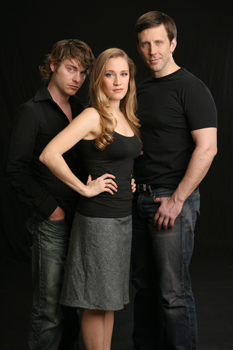 The production, which is directed by Jonathan Butterell (who choregraphed the recent Broadway revivals of Nine, Fiddler on the Roof, and Assassins, as well as the new musical The Light in the Piazza and overseen by Signature Theatre Artistic Director Eric Scaeffer, has been developed with the assistance of the Kennedy Center Fund for New American Plays. That means you can expect trappings of generous proportions: the cast will comprise 21 performers, and there will be a 14-piece orchestra. LaChiusa admits, however, the piece isn't quite what he and Pearson originally envisioned. The recent economic downtown has forced some cutbacks. "We had to do quite a lot of tweaking to make [the show] work," LaChiusa says. "Our original cast size was to be 24 to 25...our original orchestra was going to be 17."
The production, which is directed by Jonathan Butterell (who choregraphed the recent Broadway revivals of Nine, Fiddler on the Roof, and Assassins, as well as the new musical The Light in the Piazza and overseen by Signature Theatre Artistic Director Eric Scaeffer, has been developed with the assistance of the Kennedy Center Fund for New American Plays. That means you can expect trappings of generous proportions: the cast will comprise 21 performers, and there will be a 14-piece orchestra. LaChiusa admits, however, the piece isn't quite what he and Pearson originally envisioned. The recent economic downtown has forced some cutbacks. "We had to do quite a lot of tweaking to make [the show] work," LaChiusa says. "Our original cast size was to be 24 to 25...our original orchestra was going to be 17."
Regardless, musical theatre fans don't have to worry about seeing less of LaChiusa. Signature is also presenting his acclaimed 2005 musical See What I Wanna See, an adaptation of "Rashomon" and other stories by Ryunosuke Akutagawa, which is currently in performances (through May 31). And his other musicals have been receiving many regional and foreign productions: Just recently, Bernarda Alba (2006) has been done in Chicago and Budapest, The Wild Party was the inaugural production of the new freeFall Theatre Company in Sarasota, Florida, and See What I Wanna See had a sold-out run in Korea.
"I was the oldest person in the audience," LaChiusa says of that production. "Everybody was like 30 and under. They're a very young theatregoing audience there—maybe because TV sucks in Korea!—but they're very much engaged in theatre, and it's very much a part of their culture. They love musicals. They speak to them."
Though LaChiusa's work has often proved controversial and divisive in New York, he does think that the city is becoming more accepting of unusual musicals than it used to be. "I'm very optimistic about certain things that have happened in recent years, that maybe we've turned a corner and we have a little braver producing element and taking some musicals that might at first glance have seemed very risky," LaChiusa says. "I'm very, very encouraged by that. Adding Machine was very interesting to me [last season]; that was great that they brought it to NY and that the producers let it have a lovely run. I loved that they took Passing Strange to Broadway. And I thought it was interest to have Spring Awakening play on Broadway—it's very interesting material."
What else is LaChiusa working on? "We got a commission from the Mark Taper Forum, and they commissioned us to write a second act for Tres Niñas, so I'm working on that with Ellen Fitzhugh," he says about his one-act musical that premiered Off-Broadway last year. "Sybille and I are going to dive into adapting Scheherazade for the Met Opera Commission. And I have a Carmen adaptation in [the works] for Audra McDonald."
But all that's in the future. Right now, Giant is his big focus.
"Right now, we're looking at this as an event," he says. "If there is a future, there's a future, and we'll come to that when it's time. Right now, the most important thing is putting together the premiere down in D.C. After that, who knows?"
Photos (top to bottom): Michael John LaChiusa; Ashley Robinson, Betsy Morgan, and Lewis Cleale of Giant at the Signature Theatre (photo by Joan Marcus)
Posted by Matthew Murray on Sunday, April 12, 2009 at 10:05 AM | Item Link
Archive of Matthew Murray's columns
Summer School for Broadway's Just-Finished Season by Matthew Murray
The Broadway season and the traditional school year don't match up exactly—especially since, these days, the former is year-round—but they ebb and flow at more or less the same time. Xanadu and Old Acquaintance have already made their 2007-2008 bows, but it won't be until classes resume in the fall that the majority of plays and musicals start opening in earnest. But just because it's summer vacation doesn't mean we can't spend our time learning, so let's catch up with what some of the previous season's cast recordings have to teach us.
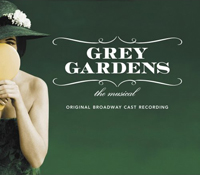 How to Transfer an Off-Broadway Show to Broadway. I was not among the enamored who stormed the doors of Playwrights Horizons multiple times in the spring and summer of 2006 to see Grey Gardens, primarily because of star Christine Ebersole who was anointed in ways that would have made Hugh Jackman (The Boy From Oz) blush. During my one and only viewing, the show struck me as a well-intentioned curiosity that didn't live up to the potential of writers Scott Frankel (music), Michael Korie (lyrics), or Doug Wright (book) or its larger-than-life subjects, Edith Bouvier Beale and her daughter "Little Edie" Beale. So when it was announced that the show was moving to Broadway, I was nonplussed: Why did anyone think a show acclaimed solely for its stars—neither of whom is a household name— would stand a chance on Broadway? Now that Ebersole and her co-star Mary Louise Wilson have both won Tony Awards and the show is ramping up toward its closing this Sunday, I still can't answer that question.
How to Transfer an Off-Broadway Show to Broadway. I was not among the enamored who stormed the doors of Playwrights Horizons multiple times in the spring and summer of 2006 to see Grey Gardens, primarily because of star Christine Ebersole who was anointed in ways that would have made Hugh Jackman (The Boy From Oz) blush. During my one and only viewing, the show struck me as a well-intentioned curiosity that didn't live up to the potential of writers Scott Frankel (music), Michael Korie (lyrics), or Doug Wright (book) or its larger-than-life subjects, Edith Bouvier Beale and her daughter "Little Edie" Beale. So when it was announced that the show was moving to Broadway, I was nonplussed: Why did anyone think a show acclaimed solely for its stars—neither of whom is a household name— would stand a chance on Broadway? Now that Ebersole and her co-star Mary Louise Wilson have both won Tony Awards and the show is ramping up toward its closing this Sunday, I still can't answer that question.
However, comparing PS Classics's recording of the Broadway version to its Off-Broadway counterpart (reviewed here) reveals how serious the creators were about improving for the move: There's not a single change evident that's not for the better. That begins (most crucially) with the casting of Erin Davie, who replaced Sara Gettelfinger in the role of Edie in 1941 and brings a much more convincing voice and manner to the role of the disturbed, soon-to-be-deflated socialite and is considerably more apt alter-ego for Christine Ebersole. New first-act songs "The Girl Who Has Everything," "Goin' Places," and "Marry Well" are excellent substitutes for the originals that better capture the sad, fractured irony of the society-addicted Bouvier family coming apart at the seams. A number of tracks have been reused from the Off-Broadway recording, so if you think things sound familiar, you're right. But Frankel and Korie's Cole Porter Fringe score improves somewhat on multiple listenings, so you'll have to get used to it to get the most out of Grey Gardens. The show will be better remembered for its star turns than for anything it actually says (it doesn't say much), but the Broadway recording makes a far better case for the show as a work of art, if a tarnished one.
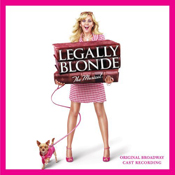 Eighteen Ways to Cure Insomnia as Loudly as Possible. In the annals of musical theatre, there have surely been worse scores than Laurence O'Keefe and Nell Benjamin's for Legally Blonde, but you'll have to work to find one more boring. Having seen his Bat Boy and their Sarah, Plain and Tall, I remain astonished that such gifted young artists could turn out songs as assaultingly awful as those in the show that the new Sh-K-Boom recording preserves. Nearly every one is a stop-the-show-or-bust ear-splatterer, and the ones that aren't are insipid enough to be practically contemptible. Laura Bell Bundy's belting in the sorority-girl-turned-Harvard-Law-upstart lead role is accomplished but passionless, leading man Christian Borle's sense of humor shines through his sub-par material, and Kate Shindle gets five seconds of terrific air time in the title track. But finding much else of worth in this entirely extractable score isn't worth the effort. Your time and money would be better spent renting the charming 2001 film (starring Reese Witherspoon) on which this soporific enterprise is based.
Eighteen Ways to Cure Insomnia as Loudly as Possible. In the annals of musical theatre, there have surely been worse scores than Laurence O'Keefe and Nell Benjamin's for Legally Blonde, but you'll have to work to find one more boring. Having seen his Bat Boy and their Sarah, Plain and Tall, I remain astonished that such gifted young artists could turn out songs as assaultingly awful as those in the show that the new Sh-K-Boom recording preserves. Nearly every one is a stop-the-show-or-bust ear-splatterer, and the ones that aren't are insipid enough to be practically contemptible. Laura Bell Bundy's belting in the sorority-girl-turned-Harvard-Law-upstart lead role is accomplished but passionless, leading man Christian Borle's sense of humor shines through his sub-par material, and Kate Shindle gets five seconds of terrific air time in the title track. But finding much else of worth in this entirely extractable score isn't worth the effort. Your time and money would be better spent renting the charming 2001 film (starring Reese Witherspoon) on which this soporific enterprise is based.
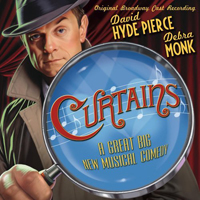 How a Career that Starts with a Bang Can Go Out With a Whimper. John Kander and Fred Ebb were once at the forefront of musical theatre innovation, creating scores for shows like Cabaret and Chicago that pushed musical theatre to its most theatrical limits. So why are their later scores drowned in traditionalism almost to a fault? I didn't understand it with Steel Pier (1997), I didn't understand it with All About Us, and I don't understand it with Curtains. Granted, the circumstances here were unusual, in no small part because lyricist Ebb died (in 2004) before it was completed, leaving composer Kander and then-librettist Rupert Holmes to finish it on their own. But it's still lesser work notable only because of Kander and Ebb's involvement.
How a Career that Starts with a Bang Can Go Out With a Whimper. John Kander and Fred Ebb were once at the forefront of musical theatre innovation, creating scores for shows like Cabaret and Chicago that pushed musical theatre to its most theatrical limits. So why are their later scores drowned in traditionalism almost to a fault? I didn't understand it with Steel Pier (1997), I didn't understand it with All About Us, and I don't understand it with Curtains. Granted, the circumstances here were unusual, in no small part because lyricist Ebb died (in 2004) before it was completed, leaving composer Kander and then-librettist Rupert Holmes to finish it on their own. But it's still lesser work notable only because of Kander and Ebb's involvement.
The idea of a murder mystery set amid a foundering Boston tryout of a Broadway musical, with the investigating detective solving both dilemmas, is not a bad one. And, onstage at the Hirschfeld, Holmes's book crackles with clever comedy, superb pacing, and sharp dialogue befitting the best of contemporary musical comedy books. But the songs don't hold up their end of the bargain, wavering between musical theatre cheerleading ("Show People"), backstage bitching ("What Kind of Man"), diegetic numbers far too good at painting the Robbin' Hood musical as a show in dire straits, and character songs with all the bite of marshmallow fluff. Some casting is excellent: David Hyde Pierce provides a flawless rendition of the reluctant-leading-man police officer, Debra Monk is a belty delight as a nail-hard matron of a producer, and Edward Hibbert is a riot as the acidic director. Other performers make weaker impressions, most notably Karen Ziemba and Noah Racey as the leads in the show-within-a-show who wouldn't have survived past the second row in the show's era (1959) when charisma was king. But nearly every strain of Kander melody, with a lyric from Ebb, Holmes, or his own hand, reminds you that a man once dedicated to expanding boundaries is now far too content at operating within them.
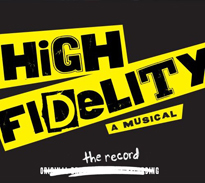 The Importance of Out-of-Town Tryouts. High Fidelity was one of the season's saddest failures, a two-week tragedy that had everything going for it except time. Several decades ago, a show like this one would be afforded two or three tryout stops to work out the kinks with a difficulty property (Nick Hornby's novel, and the ensuing film, about growing up and growing into love), and could well have come to Broadway a hit. This one had but one tryout stop, in Boston, where (I'm told) not too many changes were made. It limped into New York, played some previews, then died in December after 13 performances, despite some of the most distinctive musical work of the season from composer Tom Kitt and lyricist Amanda Green. (The book, by David Lindsay-Abaire, was at best adequate.)
The Importance of Out-of-Town Tryouts. High Fidelity was one of the season's saddest failures, a two-week tragedy that had everything going for it except time. Several decades ago, a show like this one would be afforded two or three tryout stops to work out the kinks with a difficulty property (Nick Hornby's novel, and the ensuing film, about growing up and growing into love), and could well have come to Broadway a hit. This one had but one tryout stop, in Boston, where (I'm told) not too many changes were made. It limped into New York, played some previews, then died in December after 13 performances, despite some of the most distinctive musical work of the season from composer Tom Kitt and lyricist Amanda Green. (The book, by David Lindsay-Abaire, was at best adequate.)
"She Goes" is an infectious dissection of the male breakup aesthetic, "Number 5 With A Bullet" is a hard-rock denial session with a throbbing beat, "Nine Percent Chance" hilariously brings together in one song the show's three competing social storylines, and "The Last Real Record Store On Earth," is one of the best opening numbers in years, with so much intense, pounding energy that the losers singing it compel you to fall in love with their secret retail hangout. These songs are so good that it's pretty easy to forgive the also-rans that make up most of the rest of the score, numbers that could easily have been tweaked or replaced had the writers been able or willing to do so on the road. It's clear that everyone had the right ideas in mind, and the show's variety of rock pastiche is skillfully explored, but the proper execution never surfaced.
Hopefully Kitt and Green haven't given up on High Fidelity altogether; time, with the help of this recording, could well vindicate the show and give it another shot at success. Sadly, this Sh-K-Boom recording is markedly flat, and conveys little of the immediacy the show packed in the theatre; the performances, too, especially from Will Chase and Jenn Colella, are tentative here in a way they simply weren't at the Imperial. It's too bad High Fidelity couldn't have gotten the explosive recording it deserved, but if the show gets a second life it will be because people will be able to hear how good this score was.
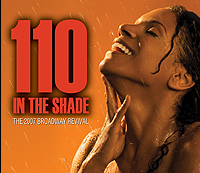 How to Revive a Musical Properly and Economically. Lovers of classic shows seldom get revivals on Broadway that can seriously be called the equals of the originals. They're almost always scaled down and/or rethought into absolute nonsense, with the needs of the show usually given last, or no, consideration. But when it came to 110 in the Shade, the Roundabout Theatre Company proved it was possible to mount a pinch-penny production of the N. Richard Nash-Harvey Schmidt-Tom Jones show and retain all its power and emotional scope. The PS Classics recording of the revival documents this beautifully.
How to Revive a Musical Properly and Economically. Lovers of classic shows seldom get revivals on Broadway that can seriously be called the equals of the originals. They're almost always scaled down and/or rethought into absolute nonsense, with the needs of the show usually given last, or no, consideration. But when it came to 110 in the Shade, the Roundabout Theatre Company proved it was possible to mount a pinch-penny production of the N. Richard Nash-Harvey Schmidt-Tom Jones show and retain all its power and emotional scope. The PS Classics recording of the revival documents this beautifully.
Stunning at the center is four-time Tony Award winner Audra McDonald, giving one of the brashest, most go-for-broke performances of her career as Lizzie Curry, a plain country girl who unwittingly becomes caught between financial security (the local lawman, File, played by Christopher Innvar), and sexual adventure (traveling rainmaker Starbuck, played by Steve Kazee). From latent hope to utter despair and finally full bloom, McDonald captures all of Lizzie's conflicting emotions and filters them through her flawless soprano, sounding as heartbreaking in the lacerating "Old Maid" as she does showstopping in "Raunchy." She receives first-tier support from Innvar, John Cullum as her father, and Chris Butler and Bobby Steggart as her brothers, though Kazee lacks the dangerous daring so necessary for Starbuck.
Beyond the casting are Jonathan Tunick's smart orchestral reductions, which highlight all the country colors of Schmidt's music, and Lonny Price's direction, which has helped everyone on the recording invest their portrayals with such life that you don't miss a nuance of the action. The recording itself has been lovingly rendered, giving you more than enough of Nash's trenchant dialogue (based uncommonly closely on his play, The Rainmaker) to follow this captivating story from beginning to end.
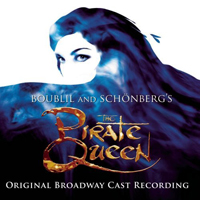 When to Know Enough's Enough. So many people were so sick of the pop opera—or had their appetites satiated by the revival of Les Misérables that no one noticed The Pirate Queen, the new show from those writers (Alain Boublil and Claude-Michel Schönberg) wasn't that bad. It only ran 85 performances on Broadway, but left behind a cast recording to forever stand as one of the most curious artifacts of one of the most curious anachronisms in years. The Sony Classics disc reveals a show with its share of gorgeous melodies, weak lyrics, and the unmistakably musty air of 1989.
When to Know Enough's Enough. So many people were so sick of the pop opera—or had their appetites satiated by the revival of Les Misérables that no one noticed The Pirate Queen, the new show from those writers (Alain Boublil and Claude-Michel Schönberg) wasn't that bad. It only ran 85 performances on Broadway, but left behind a cast recording to forever stand as one of the most curious artifacts of one of the most curious anachronisms in years. The Sony Classics disc reveals a show with its share of gorgeous melodies, weak lyrics, and the unmistakably musty air of 1989.
The best reason to take the cast recording for a spin is the forceful performance of Hadley Fraser. A newcomer (and likely one-timer) on these shores, he brings real dynamism to the watery part of Tiernan, lover of the title character Grace O'Malley. Unfortunately, the uniter of the disparate Irish tribes herself—who caught the eye and ear of British monarch, Queen Elizabeth I (for which Linda Balgord provided the most bizarre, quasi-camp characterization of the season)—is played by Stephanie Block as an all-out beltaholic. Her bombastic style perfectly fits the score's power-folk mold, but doesn't capture the same desparate, sexual energy that Fraser's more outwardly restrained vocals do. He's especially good in the absurdly radioactive throat-buster ballad "I'll Be There," making a must-listen moment from a song that helped hammer the final nails in the coffin of the entire genre.
Still, compared to the last Boublil-Schönberg debacle to hit America, Martin Guerre, The Pirate Queen is several steps ahead in quality and several miles behind in ridiculousness. The show looked great, sounded fine, and captured a definite (if overblown) honesty missing from most of the season's hits. Had it opened 15 ago, it might have eked out a run of two or three seasons by riding on the wave of the British invasion's popularity. But while The Pirate Queen was far from problem-free, its biggest problem was its inability to overcome the simple fact that its time was just past.
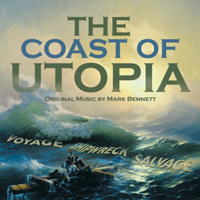 Make a Play—or Three—Feel Like a Musical. The theatrical event of the season—perhaps the decade—was The Coast of Utopia, Tom Stoppard's brilliant trilogy depicting the national and personal revolutions of a group of Russian friends over the course of several 19th-century decades. While intelligent and engrossing, it also offered a compelling musical component in Mark Bennett's swirling soundscape score, which underscored both the playfulness and import of the wheels turning and the castles burning. Ghostlight Records has recorded that score, and the resulting disc is a fascinating and listenable study of musical dramatism that most of the other artists whose shows we've observed here would do well to observe.
Make a Play—or Three—Feel Like a Musical. The theatrical event of the season—perhaps the decade—was The Coast of Utopia, Tom Stoppard's brilliant trilogy depicting the national and personal revolutions of a group of Russian friends over the course of several 19th-century decades. While intelligent and engrossing, it also offered a compelling musical component in Mark Bennett's swirling soundscape score, which underscored both the playfulness and import of the wheels turning and the castles burning. Ghostlight Records has recorded that score, and the resulting disc is a fascinating and listenable study of musical dramatism that most of the other artists whose shows we've observed here would do well to observe.
Familiarity with the story will help a great deal and only amplify the impact of Bennett's music, but you don't need to have run the Marathon (or any of its three individual legs) to be transported. All you need are five tracks: the "Trilogy Prologue," the three finales, and the rousing curtain call to get your money's worth. Bennett's work superbly complements Stoppard, and serves as an invigorating reminder that the fun and excitement of Broadway compositions are never limited strictly to musicals.
Posted by Matthew Murray on Wednesday, July 25, 2007 at 7:30 AM | Item Link
Archive of Matthew Murray's columns
Something Old, Something New, Something Borrowed, Something White by Matthew Murray
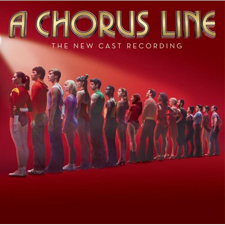 Anyone who's ever used a copy machine knows that a reproduction never looks quite as good as the original. One can only assume that Bob Avian and Baayork Lee, respectively the director and choreographer of the current Broadway revival of A Chorus Line, have devoted so much of their lives to the theatre that they've never learned this simple lesson. In attempting to recreate the landmark work of the show's original director-choreographer-conceiver, Michael Bennett, they constructed something that, like a photocopy, is all visible pieces and no fine detail. However, there was no reason to believe that the revival's cast recording would necessarily suffer from the same problems. But suffer it does.
Anyone who's ever used a copy machine knows that a reproduction never looks quite as good as the original. One can only assume that Bob Avian and Baayork Lee, respectively the director and choreographer of the current Broadway revival of A Chorus Line, have devoted so much of their lives to the theatre that they've never learned this simple lesson. In attempting to recreate the landmark work of the show's original director-choreographer-conceiver, Michael Bennett, they constructed something that, like a photocopy, is all visible pieces and no fine detail. However, there was no reason to believe that the revival's cast recording would necessarily suffer from the same problems. But suffer it does.
Ultimately, the Masterworks Broadway recording is much like the production that spawned it: polished, efficient, but no substitute for the original. From orchestrations that have been reduced in some places (why is the harp always the first thing to go?) and unwisely modified in others (the exciting, brassy build of the opening number is spoiled by giving away too much too soon; "What I Did For Love" has been denuded of much of its immediacy) to a cast full of too many singing mannequins, this recording never capitalizes on the energy and excitement that have always defined this musical about dancers putting their lives on the line to do what they love for as long as they can.
For every Jeffrey Schecter, who finds the right kind of witty show-offishness for "I Can Do That," there's a Chryssie Whitehead to make "Sing!" more about smarmily creative nonsinging than a codependent couple struggling to keep themselves together while forced into the spotlight, as well as a Deidre Goodwin, a Charlotte D'Amboise, and a Natalie Cortez to make great roles like bitch-on-wheels Sheila, faded star Cassie, and eternally optimistic Diana fade into the background. If you find yourself hearing things you've never heard before in their big showstopping numbers, it's probably not because they're illuminating things the roles' originators missed.
No, what impresses most here is the score by Marvin Hamlisch and Edward Kleban, one of the musical theatre's rawest and most distinctive. Hamlisch's tunes perfectly capture the twinkling and burned-out lights of Broadway, in all its faux-glitz glory; Kleban's intricate, emotionally naked lyrics delight in their alternately high-minded and guttural perspectives on everything from plastic surgery ("Dance: Ten, Looks: Three') to desperation of the heart and career ("The Music and the Mirror") and Broadway pastiche ("One"). You also get to hear more of them than ever before, with the full "Hello, Twelve, Hello Thirteen, Hello montage," running over 20 minutes, recorded for the first time, in its proper running order.
You don't, however, get to hear everything: "The Tap Combination," a brief collection of exhausted one-liners for the penultimate scene, and "And...", about the dancers' uncertainty about sharing their life stories, is still gone. The latter is a particularly egregious omission, as it was the only full song not recorded by the original cast in 1975, and it was recorded by the revival cast, but left off the album so it could be made available as an exclusive download on a certain online music store I won't dignify with a mention here. As the disc runs barely an hour, there was no lack of space, but the desire to give people a fresh, full product was as unmistakably absent here as it was from the revival itself.
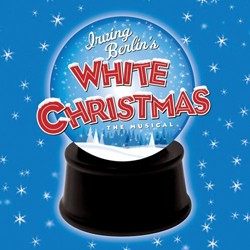 By contrast, the producers behind the everywhere-but-New York spectacle White Christmas, adapted from the classic 1954 film, set out to give audiences everything and the kitchen sink, at least in terms of a Great Big Musical Experience. While I haven't seen the show in any of its incarnations, Ghostlight’s new recording of the stage score suggests a walloping entertainment success.
By contrast, the producers behind the everywhere-but-New York spectacle White Christmas, adapted from the classic 1954 film, set out to give audiences everything and the kitchen sink, at least in terms of a Great Big Musical Experience. While I haven't seen the show in any of its incarnations, Ghostlight’s new recording of the stage score suggests a walloping entertainment success.
If this gloriously glitzy undertaking doesn't offer much in the way of nutrition, listening to some of today's top musical talent rattling off a catalog of some of Irving Berlin's finest songs at least ensures a sumptuous feast of empty-calorie goodness. From "Happy Holiday," sung by Jeffry Denman and Brian d'Arcy James, through "Sisters" (attractively melted through by Anastasia Barzee and Meredith Patterson), "Blue Skies," and the one-two-punch finale of the title song and "I've Got My Love to Keep Me Warm," every song has the outsized feeling of a titanic production number. One can easily imagine watching each new musical wonder unfold on a giant stage, with a veritable army of dancers and singers ripping up the joint.
Such uncorkable energy is almost the undoing of the recording (and, one suspects, the show itself): Even the relatively laid-back offerings are of the hard-sell variety, and the contrast of quiet, wistful, ruminative explorations of the heart and soul that truly make any great musical are missing. True, Berlin's having died 17 years ago makes that an unlikely proposition, but wall-to-wall-to-wall roof-raisers can't help but lose their punch after a while, regardless of how good the performers are. And every one of them here is a gem.
The one exception is Karren Morrow, who proves herself a pearl of even greater price: Former Broadway headliner Morrow, playing former Broadway headliner Martha Watson, blasts Barzee and Patterson (and half the orchestra) out of the arena with her trombone-like belt. It has, as far as I can tell, lost practically none of its estimable luster in the nearly 42 years since Morrow recorded I Had a Ball, in which she delivers some of the most exciting singing of the '60s theatre scene. Morrow, sadly, doesn't sing much here: She's prominently featured in only two numbers, though she makes a lasting impression in both: "Falling Out of Love Can Be Fun" and "Let Me Sing and I'm Happy." As long as Morrow's singing, I'm Happy, but the rest of White Christmas is almost as good a cure for the rainy-day blues.
Posted by Matthew Murray on Monday, October 23, 2006 at 10:31 PM | Item Link
Archive of Matthew Murray's columns
The Perfect Romance by Matthew Murray
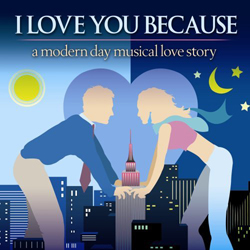 Quantity certainly won out over quality on Broadway last season: Of the 12 musical non-revivals, the most interesting show was also the most catastrophic (In My Life) and the others weren't much to write home about. Off-Broadway, however, fared appreciably better, with two shows that -- if there's any justice -- will one day be considered true classics. The first, Michael John LaChiusa's Bernarda Alba, was one of the darkest dramas in the history of the integrated musical. The other was a sparkling comedy, on par with the best Broadway has offered in the last couple of decades: I Love You Because.
Quantity certainly won out over quality on Broadway last season: Of the 12 musical non-revivals, the most interesting show was also the most catastrophic (In My Life) and the others weren't much to write home about. Off-Broadway, however, fared appreciably better, with two shows that -- if there's any justice -- will one day be considered true classics. The first, Michael John LaChiusa's Bernarda Alba, was one of the darkest dramas in the history of the integrated musical. The other was a sparkling comedy, on par with the best Broadway has offered in the last couple of decades: I Love You Because.
If you haven't heard of it, you're not alone: The show opened at the Village Theatre on Valentine's Day and closed three months later, having gone largely unnoticed in the wake of one of the busiest (and most overrated) Broadway musical seasons in memory. But now that PS Classics has released the show's wonderful cast recording, more people will hopefully be exposed to this delightful modern romance, which introduced to theatregoers the songwriting gifts of Joshua Salzman and Ryan Cunningham.
With this show, they achieved what far too many writers today can't: They wrote an old-fashioned show that's also rigorously contemporary. Though they took as their starting point the novel Pride and Prejudice, only true Jane Austen devotees will be able to determine the precise extent of the show's similarity to it: In style, originality, and pure cunning, the closer kin of I Love You Because are On the Town, Guys and Dolls, and Wonderful Town, those quintessential musical comedies as much about the passionate love of New York City as about the passionate love between people.
All this bursts forth from the cast recording beginning with the opening number, both a gentle parody of those titles' paeans to NYC and a full-fledged member of the club: "Another Saturday Night in New York" instantly signals the bouncy, youthful optimism on which the show will be built. This tribute to the city's aphrodisiacal powers is a somewhat ironic beginning to the show, which is as much about the difficulties of finding love in New York as it is about the joys; when its singer, greeting card writer Austin Bennet (Colin Hanlon) discovers immediately afterwards that his girlfriend Catherine is sleeping with another guy, you might wonder whether you, too, have been had.
Not at all. The show builds on both its opener and its musical-comedy street cred in all subsequent numbers, which on the recording outline (with only brief snatches of dialogue) this tormented and twistedly funny love story. But first, the other main characters: Austin gets advice from his brother, Jeff (David A. Austin) about ignoring Catherine in the fraternal "Oh What a Difference"; recently jilted photographer Marcy Fitzwilliams (Farah Alvin) learns from her friend Diana Bingley (Stephanie D'Abruzzo) the higher mathematics surrounding rebound relationships in "The Actuary Song," one of the most dizzyingly creative patter songs of any new musical in years. Once the players are in place, Austin and Marcy meet over "Coffee" and learn that their differences -- he's a fastidious, anal-retentive Republican; she's a fly-by-the-seat-of-her-pants Democrat -- are as infuriating as they are attractive, and it's only a matter of time until they get together, break up, and get back together again. Jeff and Diana, no fans of convention, don't want to fall in love, but they can't help it either. The city just has that effect on people. (As if to prove this, a generic NYC Man and Woman, played by Jordan Leeds and Courtney Balan, are always around to comment on the action.)
But if the general story is familiar, the specifics have rarely been as fresh. "...But I Don't Want to Talk About Her," in which Austin can't stop blabbing about Catherine, is an astoundingly astute awkward first-date song. Austin can't fathom commitment so soon after his breakup, but embraces it with the uncertain but masculine "Maybe We Just Made Love"; Marcy insists she'll love Austin someday, but "Just Not Now," in a pseudo-rejection song so cruelly sensible, one can only wonder if Cunningham has heard exactly that speech in his own life. Songs of denial ("Alone," "What Do We Do It For?"), acquiescence ("Even Though"), and acceptance ("But I Do," "Goodbye") cover traditional emotional ground, but remain so rooted in the emotional attitudes of 2006, it's as if you're hearing the sentiments for the first time.
While Salzman's music gleefully slides every which way across the pop spectrum, and has been cheerfully orchestrated by Larry Hochman, it's Cunningham's work that stands out most. His lyrics are always unpredictable (one song references Szechuan tofu and boxed wine; another uses a pickle as an extended comic metaphor) and fused to the action more fully than most shows dare attempt. The lyrics alternate between perturbed and romantic, and between ironic and passionate, firing at you in quick pulses or a more leisurely flow that underscore the friction between Austin and Marcy in constantly surprising ways.
The casting is as fitting a study of contrasts: You can almost hear Austin's tie cutting off his speech in Hanlon's cleverly constricted and charmingly sung performance, which leaves him plenty of room for eventually coming out of his shell. Alvin, whether holding back or letting loose with her unrestrained comic fury, is the true find of this show, so sweet one minute and so sour the next, it's sometimes hard to remember one actress does it all. Leeds and Balan have a limited presence on the recording, but display their cheeky omnipresence in every line and lyric they deliver.
As onstage, D'Abruzzo and Austin tend to push harder than they need to: She sounds affectedly precise, and he strains at being free-wheeling and libidinous. But does it really matter? As the title song posits, it's the flaws and peccadilloes that make life and love worthwhile, and D'Abruzzo and Austin are at least not lacking in personality. They only add to the heady blend of textures that, as with the music and the lyrics, make the score feel even more diversely New York. If they're not everything they could be, it's hard to imagine I Love You Because being better than it is.
Posted by Matthew Murray on Thursday, October 05, 2006 at 6:40 PM | Item Link
Archive of Matthew Murray's columns
Broadway CD Roundup (7/30/2006) by Matthew Murray
Say what you will about the new musicals that opened on Broadway last season, but each one could at least be categorized by its relationship to popular music. Three recently released cast recordings of last season's Broadway offerings present an intriguingly varied look at the way pop influences musicals today.
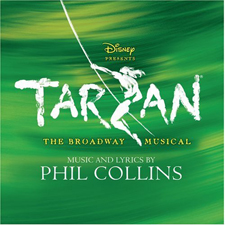 First up is Tarzan, Disney's latest offering to swing in and slam headfirst into a wall. The genesis of this stage version was the 1999 animated Disney film that featured the unholy marriage of Phil Collins' syrupy song stylings with the classic Edgar Rice Burroughs story. The stage adaptation is, if anything, more outlandishly unwatchable than the film, directed by Bob Crowley as if to pander to and increase the numbers of both the colorblind and the deaf. It also ranked as the least theatrical new musical of the season, no small achievement with competition like Lennon, In My Life, and Ring of Fire.
First up is Tarzan, Disney's latest offering to swing in and slam headfirst into a wall. The genesis of this stage version was the 1999 animated Disney film that featured the unholy marriage of Phil Collins' syrupy song stylings with the classic Edgar Rice Burroughs story. The stage adaptation is, if anything, more outlandishly unwatchable than the film, directed by Bob Crowley as if to pander to and increase the numbers of both the colorblind and the deaf. It also ranked as the least theatrical new musical of the season, no small achievement with competition like Lennon, In My Life, and Ring of Fire.
But as theatricality is not a necessary prerequisite for a solid cast recording, it's unsurprising that the Tarzan OCR is several steps up from what's currently chimping around the Richard Rodgers. Collins' finely tuned pop sensibility ensures that numbers mimic banana peels onstage hear sound juicier and more important. With a better sound balance than in the theater and an almost complete absence of David Henry Hwang's "book" (one of the worst to hit Broadway since, well, his revised version of Flower Drum Song in 2002), it's easier to accept the songs as contextless one-offs that don't have to make sense in a dramatic context. Seen (or heard) that way, "You'll Be In My Heart" (Collins' 1999 Oscar winner) is almost an attractive, contemporary ballad, and "Strangers Like Me" and "For the First Time" can almost-sort of-nearly be taken as vaguely possible character songs for two people getting acquainted. That's not to say those people could be Tarzan (Josh Strickland, demonstrating all the skills that served him on American Idol) or Jane (the ever-wasted Jenn Gambatese), but let's not pick nits.
Of course, the songs that try to serve the story fall flat -- "Who Better Than Me" for Terk (a game Chester Gregory II) and young Tarzan (Daniel Manche) is overdone, and a pair of blabby numbers for Tarzan's adoptive ape parents (Shuler Hensley and Merle Dandridge) are at best undercooked. But if you do what Collins didn't -- keep your expectations low while leaving well enough alone with the rest -- it's possible to get more enjoyment out of Tarzan on disc than the stage show might lead you to believe.
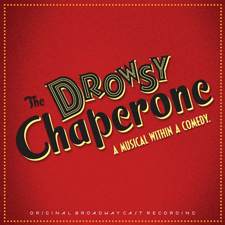 At the other end of the spectrum is The Drowsy Chaperone, which avoids pop with all its might. While I remain unconvinced that the Lisa Lambert-Greg Morrison score is really reminiscent of a 1928 musical comedy, it's at least a solid attempt at creating a theatrical musical comedy score in a season that didn't have much use for them.
At the other end of the spectrum is The Drowsy Chaperone, which avoids pop with all its might. While I remain unconvinced that the Lisa Lambert-Greg Morrison score is really reminiscent of a 1928 musical comedy, it's at least a solid attempt at creating a theatrical musical comedy score in a season that didn't have much use for them.
Bob Martin (who co-wrote the show's book with Don McKellar) narrates here, as he does onstage, as "Man in Chair," a show queen wiling away the hours playing his cherished recording of The Drowsy Chaperone. Martin's presence, while sadly limited on the recording, gives you a sampling of the stage witticisms you're missing without interrupting the nonstop turntable of musical confections Lambert and Morrison serve up. If the songs are extremely variable in quality -- only the wedding finale, "I Do, I Do In the Sky," sung by Kecia Lewis-Evans, stands out compositionally -- they're all performed with a buoyant, loving energy. Sutton Foster's "Show Off" showpiece and "Bride's Lament" allow her to demonstrate her belty range (such as it is), while Tony winner Beth Leavel gets to masticate some scenery with her "rousing anthem" "As We Stumble Along," and song-and-dance man extraordinaire Eddie Korbich gets a couple of (all-too-brief) moments to shine on his own. (When will someone write a show around him?)
Not everything transfers: Troy Britton Johnson, as the toothy naïf, is all liquid smarm, with none of the errant likeability he possesses onstage. Lenny Wolpe, as a meddling producer, and Jennifer Smith, as his dopey squeeze, are exactly as they appear onstage, which is not to the benefit of the recording. Georgia Engel and Edward Hibbert, as a doddering duo of upper-crust onlookers, are acceptable if lifeless, strutting their stuff only in a bonus track of a song cut after the show's West Coast premiere ("I Remember Love"). As for Danny Burstein's map-defying Latin lover Adolpho, it is perhaps most charitable to say he's an acquired taste; while I think he takes over-the-top too far, your mileage might vary. Still, if The Drowsy Chaperone isn't all it could have been, this cast recording (with mock-LP liner notes that alone are worth the price) makes a better case for the show than the show itself does.
 Finally, there's The Wedding Singer, placed as uncomfortably between the two previous recordings in terms of its pop and theatre allegiances as it is onstage at the Al Hirschfeld. Existing for no other reasons than to give New Line Cinemas a Broadway brand for its 1998 Adam Sandler movie and to string together countless banal 1980s references into its "book" (Chad Beguelin and film writer Tim Herlihy), this isn't top-drawer material that ever had a chance of producing a top-drawer recording.
Finally, there's The Wedding Singer, placed as uncomfortably between the two previous recordings in terms of its pop and theatre allegiances as it is onstage at the Al Hirschfeld. Existing for no other reasons than to give New Line Cinemas a Broadway brand for its 1998 Adam Sandler movie and to string together countless banal 1980s references into its "book" (Chad Beguelin and film writer Tim Herlihy), this isn't top-drawer material that ever had a chance of producing a top-drawer recording.
But if, like our other offerings, The Wedding Singer is better on disc than onstage, it won't exactly earn a permanent place in your disc changer. Sure, you get the lovely Laura Benanti in full bubble-gum mode in "Someday" (the show's best, bounciest musical moment), and when and she and costar Stephen Lynch (as the title character, aka Robbie Hart) duet on the we're-not-in-love "Not That Kind of Thing" and oh-yes-we-are "If I Told You," you sense an inkling of chemistry. But absolute lyrical clarity is plague upon the houses of stage just-made-its like the desperate opening "It's Your Wedding Day," two numbers for jilting and unjilting hair metal-girlfriend Felicia Finley, and, well, everything else. And the numbers that bomb onstage, like everything for Amy Spanger and Matthew Saldivar as a limp secondary couple and Kevin Cahoon as a listless Boy George impersonator, are deadlier than ever.
One can't help but feel especially sorry for Rita Gardner, as the with-it granny who gets to bitch and rap and walk away with some easy laughs in the theater, but is as lifeless on the recording as just about everyone else. Nonetheless, her natural talent (and still-shimmering) soprano shine through; Gardner's had a long, distinguished career that will hopefully still take her better places than The Wedding Singer, with scores that deserve to be heard onstage and on disc -- whether they're more musical-theatre oriented or pure pop.
Posted by Matthew Murray on Sunday, July 30, 2006 at 9:48 PM | Item Link
Archive of Matthew Murray's columns
Off-Broadway CD Roundup (7/21/2006) by Matthew Murray
The fine folks over at Ghostlight Records have been working overtime, preserving for posterity even more shows that might not otherwise receive recordings. But what will posterity say about several of the Off-Broadway shows from last season that Ghostlight has recently recorded?
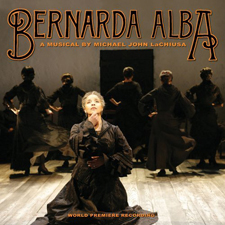 One can only assume (hope?) that future musical theatre historians will treat Bernarda Alba better than did many reviewers upon its premiere at Lincoln Center's Mitzi E. Newhouse Theater this past season. But whether this recording of Michael John LaChiusa's latest will spur that reconsideration is an open question. As directed and choreographed by Graciela Daniele, doing what may have been her finest work since Once On This Island (1990), the show was an intensely visual experience that found precise (and stunning) musical analogues for the emotions of Lorca's modern classic, The House of Bernarda Alba. Without those visuals, and without much of the piercing dialogue, this recording doesn't adequately convey the oppressive heat that made the show such a gloriously suffocating stage experience.
One can only assume (hope?) that future musical theatre historians will treat Bernarda Alba better than did many reviewers upon its premiere at Lincoln Center's Mitzi E. Newhouse Theater this past season. But whether this recording of Michael John LaChiusa's latest will spur that reconsideration is an open question. As directed and choreographed by Graciela Daniele, doing what may have been her finest work since Once On This Island (1990), the show was an intensely visual experience that found precise (and stunning) musical analogues for the emotions of Lorca's modern classic, The House of Bernarda Alba. Without those visuals, and without much of the piercing dialogue, this recording doesn't adequately convey the oppressive heat that made the show such a gloriously suffocating stage experience.
But it does preserve a cast so spectacular that everyone must be mentioned in equal measure: Yolande Bavan, Judith Blazer, Candy Buckley, Nikki M. James, Sally Murphy, Phylicia Rashad, Daphne Rubin-Vega, Saundra Santiago, Laura Shoop, and Nancy Ticotin all display, even on disc, enough of the inherent power of their work onstage to convince you you're listening to something very special. While you walk away from the recording with certain aural images -- the distressed plaintiveness of Rubin-Vega at the absolute peak of her powers, the myriad complexities of Rashad's Bernarda -- it's LaChiusa's songs, seamlessly blending Andalusian and LaChiusan styles, that uniquely haunts and insinuates. Expect to find imprinted on your mind certain phrases such as "I will dream of what I saw" or "That's how the boys talk to me," as well as the entirety of "The Mare and the Stallion," in which the trapped girls' sexual longings are projected onto two horses in one of the most bracingly beautiful sequences ever in a musical. Like most LaChiusa, Bernarda Alba requires (and rewards) multiple listenings, but if the full range of the show's power is never completely evident here, what's present is nonetheless an invaluable document of a superb show.
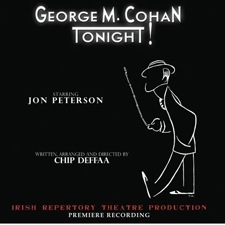 George M. Cohan Tonight!, which landed at the Irish Rep in March, would seem to be a less necessary recording. After all, haven't most of Cohan's zesty compositions so wormed themselves into the national consciousness that we seem to know them instinctively from the moment we're born? And wouldn't recordings of The Man Himself (1878-1942) always be infinitely more interesting than those of any mere imitator?
George M. Cohan Tonight!, which landed at the Irish Rep in March, would seem to be a less necessary recording. After all, haven't most of Cohan's zesty compositions so wormed themselves into the national consciousness that we seem to know them instinctively from the moment we're born? And wouldn't recordings of The Man Himself (1878-1942) always be infinitely more interesting than those of any mere imitator?
But history occasionally needs a little push, and -- as far as I know -- Cohan didn't record many of the songs in George M. Cohan Tonight!. So it's a treasure to have so many of them in one place, given the kind of energetic, ingratiating performance that Jon Peterson does here. Peterson's bright, youthful, and amazingly resilient voice brings truckloads of honest affection to standards and lesser-known tunes alike, painting Cohan as perhaps the most straightforward, emotionally honest American songwriter who ever lived. He might have worn his patriotism (like his heart) on his sleeve, but even the staunchest cynicism dissolves with the opening notes of songs like "The Yankee Doodle Boy," "You're a Grand Old Flag," or "Over There." The recording, like the show, is a bit relentless, and Peterson's marathon tapping (one of the show's highest points) mostly fizzles on disc. But with songs this great, who cares? Slice up an apple pie and bliss out.
![[title of show]](http://www.broadwaystars.com/matthew/tos225.jpg) What are historians to make of [title of show]? What are we to make of it today? Perhaps the most virulently self-referential musical ever, this creation from Jeff Bowen (music and lyrics) and Hunter Bell (book) was a stupefying sensation at the inaugural New York Musical Theatre Festival in 2004, telling the story of, well, Bowen and Bell writing the show for the inaugural New York Musical Theatre Festival in 2004. The show worked then partly because of its rampant unpredictability, partly because of the immediacy that forced you to believe every word, every event, and every emotion was true. The show, which (heavily rewritten) opened at the Vineyard this past spring and produced this recording, is no longer about that: It's now a considerably more generic look at the artistic process, with most of the original's tantalizing specificity removed. (NYMF is now any musical theatre festival, references to 2004 have been mostly elided, and so on.)
What are historians to make of [title of show]? What are we to make of it today? Perhaps the most virulently self-referential musical ever, this creation from Jeff Bowen (music and lyrics) and Hunter Bell (book) was a stupefying sensation at the inaugural New York Musical Theatre Festival in 2004, telling the story of, well, Bowen and Bell writing the show for the inaugural New York Musical Theatre Festival in 2004. The show worked then partly because of its rampant unpredictability, partly because of the immediacy that forced you to believe every word, every event, and every emotion was true. The show, which (heavily rewritten) opened at the Vineyard this past spring and produced this recording, is no longer about that: It's now a considerably more generic look at the artistic process, with most of the original's tantalizing specificity removed. (NYMF is now any musical theatre festival, references to 2004 have been mostly elided, and so on.)
The raging battle between the originality of that first go-round and the convention that's slowly crept in rages full-force on the cast recording. This uneasy blend of old and new is not at all tempered as onstage by Bell's often hilarious dialogue, which has always better captured the show's whimsical unintentionality better than the music. But from the pedantically rewritten opening number (the lyrics of which, "A, D, D, D, D, F Sharp, A / Will be the first notes / Of our show" set the tone for most of the evening's newly crafted wit), through an extraneous "second act" about life after NYMF (they won't say it, but I will) that robs the piece of what little integrity it once possessed, this show drips with the sweat of trying to cash in on its amateur street cred while behaving slickly professional. The unfocused quality even extends to the performances, which here lack all the bite they have onstage -- Bowen, Bell, Susan Blackwell, and Heidi Blickenstaff all sound so precious and syrupy, they might as well be laying down children's books on CD.
The orchestrations remain the original piano-only variety (which probably proves the authors' artistic steadfastness after all) but the changes in general suggest that Bowen and Bell would rather be a hundred people's ninth-favorite thing rather than nine people's favorite thing. (Good thing there's no song about that.) The bonus tracks, however, do more than anything else on the disc to suggest the informal fun the show has lost since 2004: The raucously roundabout title song, which envisions the words "title of show" as all different parts of speech, is an off-hand delight, while the "hidden" finale is a glimpse of the NYMF insanity that current audiences are denied. It's just a fragment of Retarded Girl: The Musical, a surprise interpolation that padded out a too-short original, but magically suggested you were watching a show where anything could happen. It may leave those who didn't see the show at NYMF -- including those pesky historians -- scratching their heads. But that's what [title of show] should do. How sad that it no longer does.
Posted by Matthew Murray on Friday, July 21, 2006 at 7:10 AM | Item Link
Archive of Matthew Murray's columns
Patti LuPone: The Lady With the Torch by Matthew Murray
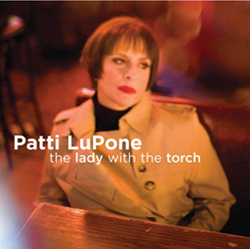 What's a self-admitted non–Patti LuPone fanatic doing with her new solo recording from Ghostlight, The Lady With the Torch?
What's a self-admitted non–Patti LuPone fanatic doing with her new solo recording from Ghostlight, The Lady With the Torch?
Like any musical theatre devotee, I'm familiar with LuPone's work in a few major titles: How can you avoid her Eva Peron in Evita? It's one of the epochal creations in a theatre era that no longer allows many. Her belting on the original cast recording, which encompasses everything up to a G (in "A New Argentina" is rightfully the stuff of modern legend. Admittedly, her visual performance as preserved on the 1980 Tony Awards broadcast is less so, but a killer voice she undoubtedly had.
Then something happened: She became a Star. The Broadway's Lost Treasures collection of Tony Award broadcast musical numbers shows her, scant years later, singing Evita's "Buenos Aires," dripping with a self-indulgent expressiveness not in evidence in the show's original Broadway cast recording. Her personality had bloated to dangerous extremes, she'd adopted a divalike attitude, and her voice was brimming with more poorly modified vowels than a high-school production of My Fair Lady. The original London cast recording of Les Misérables (1985) reveals all these qualities, as do audio and visual records of Reno Sweeney in the 1987 Lincoln Center Anything Goes. Her work there was lauded for many things, but when it came to intelligibly rattling off Cole Porter's witty, intricate lyrics... well, as she might have sung, fuggedabaaahtet.
I never saw LuPone in her early triumphs; my exposure to her was primarily through those cast recordings, which I'm afraid only accentuated her lamentable way with words. So I approached The Lady With the Torch with apprehension, hoping she'd shed her old ways for good and was working here more in the vein of the restrained Mrs. Lovett she's currently playing eight times a week in the Broadway revival of Sweeney Todd, but fearing the worst.
The results are somewhat inconclusive, but for the most part she delivers. Her powerful belt has darkened with time, but not to its detriment—it's a far more reasonable, mature sound now. And LuPone certainly knows how to turn it to her advantage: She's granted her voice so many smoky colors for this collection of 14 torch songs that she sounds as if she swallowed a pack of cigarettes. For this material, though, that's hardly inappropriate.
Of course, since LuPone never does anything halfway, she at times overdoes it. More than once you're aware of her singing about pain, but not feeling it; this imbues some numbers with a narrative quality that distractingly overwhelms their emotional content. Nor is she capable of completely eschewing the brass she likely believes her fans expect: Her ending to "The Man I Love" (the Gershwins) is particularly wide, LuPone in ultimate Showstopper Mode.
But when she allows herself to pull back and simply live within the lyrics, she can be highly affecting. "A Cottage For Sale" (Willard Robinson, Larry Conley) is equal parts heartbreaking and conversational; "I Guess I'll Hang My Tears Out To Dry" (Jule Styne, Sammy Cahn) hovers curiously (and tantalizingly) between laughter and tears, in that place that so many matters of the heart sit; and "I'm Through With Love" (Gus Kahn, Matt Malneck, Tom Adair) is awash with pitiable, naked resignation. Of course, not all her experiments are successful: Her "So In Love" (Cole Porter, from Kiss Me, Kate) is far too belty, practically squashing the song's fragile underpinnings of one-time love forever living in the realm of "almost, but not quite." Nevertheless, it's an interesting, gutsy take on the song, more appropriate here than it would ever be in an actual production.
And how's her diction? Variable, though on the good side. If she too often gives the impression of massaging the words rather than the meaning behind them, munching on some diphthongs like she might potato chips, there's not one on the disc that can't be understood. Much of this can be attributed to Chris Fenwick's gentle conducting, and Jonathan Tunick's forgiving, clubby, and yes torchy orchestrations, which alone probably do more in keeping LuPone on her best behavior than merely the excellent song selection.
Whether that will be enough to please her detractors is hard to say; there's undoubtedly too much LuPone as LuPone here to fully please anyone who doesn't buy the disc looking for exactly that. But if you're on the fence with her, as I so often am, you'll undoubtedly find enough to make The Lady With the Torch worth a listen or two.
Posted by Matthew Murray on Thursday, May 04, 2006 at 3:48 PM | Item Link
|
|||
2007-08
Broadway Season
June 28 - Old Acquaintance (AA)
July 10 - Xanadu (Hayes) [Robert Ahrens, Dan Vickery, Tara Smith/B. Swibel and Sarah Murchison/Dale Smith]
Aug 19 - Grease (Atkinson)
Oct 4 - Mauritius (Biltmore) [MTC]
Oct 11 - The Ritz (54)
Oct 18 - Pygmalion (AA)
Oct 25 - A Bronx Tale (Kerr)
Nov 1 - Cyrano de Bergerac (Rodgers)
Nov 4 - Rock 'N' Roll (Jacobs)
Nov 8 - Young Frankenstein (Hilton)
Nov 9 - Dr. Seuss' How the Grinch Stole Christmas! (St. James)
Nov 10: Local One Strike Begins
Nov 28: Local One Strike Ends
Dec 2 - Cymbeline (Beaumont)
Dec 3 - The Farnsworth Invention (Music Box) [Dodger Properties with Steven Spielberg, Dan Cap Productions, Fred Zollo, Latitude Link and the Pelican Group]
Dec 4 - August: Osage County (Imperial) [Jeffrey Richards, Jean Doumanian, Steve Traxler, Jerry Frankel, Steppenwolf]
Dec 6 - The Seafarer (Booth)
Dec 9 - Is He Dead? (Lyceum)
Dec 16 - The Homecoming (Cort) [Richards, Frankel]
Jan 10 - The Little Mermaid (Lunt)
Jan 15 - The 39 Steps (AA)
Jan 17 - November (Barrymore)
Jan 24 - Come Back, Little Sheba (Biltmore)
Feb 21 - Sunday In The Park With George (54)
Feb 28 - Passing Strange (Belasco)
Mar 6 - Cat on a Hot Tin Roof (Broadhurst) [Stephen C. Byrd]
Mar 9 - In The Heights (Rodgers)
Mar 27 - Gypsy (St. James)
Mar 29 - Macbeth (Lyceum)
Apr 3 - South Pacific (Beaumont)
Apr 17 - A Catered Affair (Kerr) [Jujamcyn Theaters, Jordan Roth, Harvey Entertainment / Ron Fierstein, Richie Jackson and Daryl Roth]
Apr 24 - Cry Baby (Marquis)
Apr 27 - The Country Girl (Jacobs)
Apr 30 - Thurgood (Booth)
May 1 - Les Liaisons Dangereuses (AA)
May 4 - Boeing-Boeing (Longacre)
May 7 - Top Girls (Biltmore)
TBA - Godspell
2008-09
Broadway Season
Oct 16 - Billy Elliot (Imperial)
Nov 08 - Dividing the Estate (a Shubert theater)
Dec 14 - Shrek: The Musical (Broadway) [DreamWorks]
Talked About
Not Scheduled Yet
TBA - 50 Words
TBA - Addams Family (Elephant Eye)
TBA - American Buffalo
TBA - An American Vaudeville [Farrell, Perloff]
TBA - The Beard of Avon [NYTW]
TBA - Being There [Permut]
TBA - Benny & Joon [MGM]
TBA - Billy Elliot
TBA - Brave New World [Rachunow]
TBA - Breath of Life [Fox]
TBA - Busker Alley [Margot Astrachan, Robert Blume, Kristine Lewis, Jamie Fox, Joanna Kerry & Heather Duke]
TBA - Broomhilda
TBA - Bye Bye Birdie [Niko]
TBA - Camille Claudel [Wildhorn]
TBA - Camelot
TBA - Carmen [Robin DeLevita and The Firm]
TBA - Catch Me If You Can
TBA - Crouching Tiger, Hidden Dragon [Bob and Harvey Weinstein]
TBA - Cry Baby [Grazer, Gordon, McAllister, Epstein]
TBA - Designing Women [Alexis]
TBA - Don Juan DeMarco [New Line]
TBA - Dreamgirls [Creative Battery]
TBA - Duet
TBA - Equus
TBA - Ever After [Adam Epstein]
TBA - Fallen Angels (Shubert) [Kenwright]
TBA - Farragut North [Richards]
TBA - Father of the Bride
TBA - The Female Of The Species (TBA)
TBA - Fool For Love (AA) [Roundabout]
TBA - Girl Group Time Travelers
TBA - Golden Boy
TBA - Harmony [Guiles, Karslake, Smith, Fishman]
TBA - Hitchcock Blonde
TBA - The Importance Of Being Earnest
TBA - Jerry Springer: The Opera! [Thoday, McKeown]
TBA - Jesus Hopped The 'A' Train (Circle)
TBA - Josephine [Waissman]
TBA - Leap of Faith
TBA - A Little Princess [Ettinger, Dodger]
TBA - Midnight Cowboy [MGM]
TBA - The Minstrel Show - Kander and Ebb and Stroman
TBA - Moonstruck [Pittelman, Azenberg]
TBA - Mourning Becomes Electra [Haber, Boyett]
TBA - Monsoon Wedding
TBA - The Night of the Hunter
TBA - The Opposite of Sex [Namco]
TBA - Orphans
TBA - Pal Joey [Platt]
TBA - Paper Doll
TBA - The Paris Letter
TBA - The Philadelphia Story
TBA - Peter Pan
TBA - Porgy and Bess [Frankel, Viertel, Baruch, Routh, Panter, Tulchin/Bartner]
TBA - The Adventures of Priscilla Queen of the Desert
TBA - The Princess Bride
TBA - Princesses [Lane, Comley]
TBA - Poe the Musical
TBA - Rain Man [MGM]
TBA - Robin Hood
TBA - Secondhand Lions
TBA - South Pacific
TBA - Speed-the-Plow
TBA - Stalag 17
TBA - Starry Messenger
TBA - Syncopation
TBA - A Tale Of Two Cities
TBA - Torch Song Trilogy
TBA - Turn of the Century
TBA - West Side Story
TBA - The Wall [Weinstein, Mottola, Waters]
TBA - Will Rogers Follies [Cossette]
TBA - The Wiz [Dodger]
TBA - Zanna [Dalgleish]
This list is compiled from various sources. If you have corrections to the Broadway Season, please contact us.
Tim Dunleavy | James Marino | Matthew Murray | Ellis Nassour | Michael Portantiere
Blind Item | Contact Us | Legal | ?
© 1997 - 2010 2die4 Productions, Inc.
https://broadwaystars.com/matthew-murray/recording | 172.70.100.126